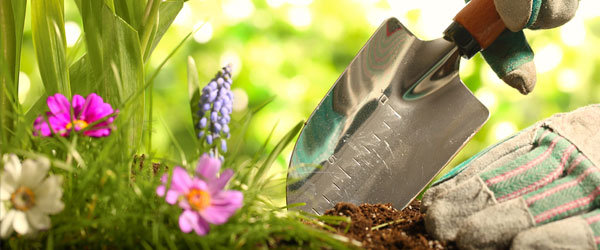
I can’t believe I’m writing a blog about gardens because I am the absolute worst gardener – ever. I’ve never been able to get anything to grow except weeds. And speaking of weeds, I don’t even know how to weed well because I don’t know a flower from a weed. I have probably single-handedly killed more healthy flowers in the name of weeding than any other person alive. I think a good part of my aversion to gardening stems from the fact that whenever I was naughty as a child (and that happened all too often), my discipline was to go weed the garden. Consequently I connect gardening with punishment and the nagging feeling that I should feel repentant about something.
As much as I dislike the act of gardening, I genuinely appreciate the beauty that others are able to cultivate and share with the rest of us. I have a deep appreciation for a number of gardeners whose homes I pass on the way to church. Their front yards are filled with what I call English gardens. The profusion of color, the varieties of shapes and sizes, and the sheer beauty of it all fills my heart with joy. That is what a good gardener does – they give the rest of us the gift of enjoyment and beauty. Some gardens are filled with delicious fruits and vegetables that nourish us. Other gardens like flower gardens can be almost magical places where one can sit in quiet reflection, enjoy the company of a loved one, or find a refuge when one’s heart is broken. Gardens can be places of nurture and renewal.
What prompted me to write about gardens; however, are not gardens I’ve seen, but two gardens from long ago that I have heard and read about: the Garden of Eden and the Garden of Gethsemane. One garden was filled with the glorious beauty and diversity of creation at it very best. God had declared it to be very good. The Garden of Eden was not only a place nourishment and nurture, it was also a place of intimacy, love, and total acceptance. In this garden two people walked hand in hand in the cool of the evening as they had face-to-face fellowship with God. As I take my evening walks and feel the satiny caress of the cool evening air, I often wonder what it would be like to be able to actually walk and talk with God. The pure glory of that overwhelms me. Unfortunately, as we all know, this bliss-filled garden was all too soon filled with words of doubt, willful disobedience, guilt, and shame. Instead of submitting to God’s will, those two human beings decided they wanted their own will to be done and chose to disobey God. What began as everlasting life, intimacy, and splendor ended in banishment and death. But God immediately put a plan into effect to bring humanity back into intimate fellowship with Him. That plan leads us to the second garden.
This second garden, the Garden of Gethsemane, is not as overwhelmingly beautiful as Eden. Its beauty is encapsulated in the human form of Jesus Christ. The intimacy and love are not just between humans and their Creator, but between Father and Son. What poignant and intense moments those must have been. Both Father and Son knew the suffering that lay ahead. I have often thought that Satan must have been doing all he could to discourage and distract Christ. The temptation for disobedience had to be more than we can imagine. After all, Jesus was divine. He had the power not to go forward with God’s plan of redemption, but He chose to submit Himself to His Father’s will and He resolutely walked the road to the cross. His choice to say, “Not my will, but your will be done,” brought life, hope, forgiveness, and redemption to an alienated and broken humanity.
As I think about those two gardens, I ask myself (and I ask you), “In which garden am I choosing to live?”
Am I in the garden of “my will be done” or have I chosen to fully submit to the garden of “your will be done.” Am I able to totally relinquish my rights, hopes, dreams, agendas, doubts, insecurities, pain, fears, and sorrow? Am I able to say, “Your will be done,” and actually live that out or do I take back parts of my life to handle myself? As I think about the two gardens, I suspect there are times when I am in either one. My heart-felt prayer for all of us is that as we grow spiritually, we will spend more and more time in the garden of “your will be done.” May this prayer of King David be our heart-felt prayer, “Teach me to do your will, for you are my God; may your good Spirit lead me on level ground.” Psalm 143:10



